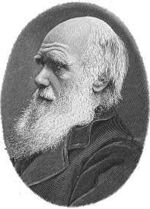Charles Darwin
Charles Darwin was a famous naturalist born in England to a Christian family on February 12, 1809. He is best known for the theory of natural selection which has since been generally accepted by biologists as the major mechanism for evolution. The concept is that biological species develop over time via natural selection, branching from common origins. Outside of evolution in particular, he was regarded as an expert on barnacles as well as credited with discovering how coral atolls were formed.
the big bearded bastard who finally proved us wrong. and we cant be having that, people will stop enslaving themselves to us. the horror!
Religious Beliefs
Charles Darwin was a Christian up and through his famous five year voyage on the HMS Beagle. But in the ensuing two years after returning to England (1836 to 1839; and in his late twenties) Darwin abandoned Christianity (1) and [sic] "had become a 'materialist' (more or less equivalent to an atheist" (2). About twenty years later in 1859 (at the age of fifty) Darwin published his famous book The Origin of Species. "In order not to hurt the feelings of his friends and wife, Darwin often used deistic language in his publications" (3). According to Darwin, the "manifestly false history of the world" (4) as recorded in the Old Testament and New Testament miracles led him to reject Biblical veracity (5). Eminent Darwin biographer, Professor Janet Browne, sums up Darwin's views concerning religion: Darwin "mapped out a comparitive evolution of the religious sense, proposing that religious belief was ultimately nothing more than a primitive urge to bestow a cause on otherwise inexplicable natural events...In short, he made no secret of his view that he did not believe religion to have any rational foundation at all" (6). Yet, in spite of these views, when he died in 1882 at the age of seventy-three, Darwin was buried at Westminster Abbey next to Sir Isaac Newton.
When investigating transmutation of species he knew that his naturalist friends thought this a bestial heresy undermining miraculous justifications for the social order, the kind of radical argument then being used by Dissenters and atheists to attack the Church of England's privileged position as the established church. Though Darwin wrote of religion as a tribal survival strategy, he still believed that God was the ultimate lawgiver. His belief dwindled, and with the death of his daughter Annie in 1851, Darwin finally lost all faith in Christianity. He continued to help the local church with parish work, but on Sundays would go for a walk while his family attended church. He now thought it better to look at pain and suffering as the result of general laws rather than direct intervention by God. When asked about his religious views, he wrote that he had never been an atheist in the sense of denying the existence of a God, and that generally "an Agnostic would be the more correct description of my state of mind."
Darwin's Illness
Charles Darwin's work set off a great deal of controversy. And Darwin closely watched the public's response to his ideas while his allies Thomas Huxley and Joseph Hooker advocated his ideas within the scientific community. For example, Richard Milner wrote regarding Darwin in the 2002 issue of Scientific American in a article entitled "Putting Darwin in his Place", that Darwin "clipped, catalogued and indexed hundreds of offprints, about 350 reviews and 1,600 articles, as well as satires, parodies and Punch caricatures, with which he filled hefty scrapbooks..." And it appears as if the criticism of his work may have troubled Darwin. Milner in the aforementioned article, wrote that after Charles Lyell published a very weak endorsement of Darwin's Antiquity of Man, "Darwin's disappointment brought on 10 days of vomiting, faintness and stomach distress". Also when anatomist St. George Mivart made a strong attack on The Descent of Man, Milner wrote it "triggered two months of "giddiness" and inability to work..."
Charles Darwin's illness afflicted him for most of his working life. [1] Most medical experts believe that Darwin's illness was psychobiological or psychological in origin.[1]
References
- Mayr, Ernst Growth of Biological Thought (1982:402).
- Mayr, Ernst One Long Argument (1991:75).
- Ibid. (1991:75).
- Barlow, Nora (editor) The Autobiography of Charles Darin (1958:85).
- Ibid. (1958:85-87).
- Browne, Janet Charles Darwin The Power of Place (2002:341)
